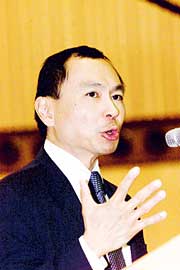Yair Ettinger, Haaretz

Direct link to this page: https://www.hayadan.org.il/terrorculture240304.html
Prof. Francis Fukuyama "does not rule out the possibility" that democratic and liberal regimes will be established in Iraq and other Arab countries in the future. After the Second World War, American advisers ruled out the possibility of democracy in Japan, and the success of democracy in Japan also makes possible the establishment of a similar regime in Iraq, he concluded and said and won the applause of over a thousand spectators, including senior Israeli academics and guests from abroad, in the elegant Smolrash Hall on the Ramat Aviv campus.
In 1989, Fukuyama, then the deputy director of the planning team at the US State Department, became a world-wide academic and media star, thanks to the essay "The End of History" he wrote, in which he pointed to the collapse of communism in Europe as a turning point in the history of the human race. He claimed that the values of the West, led by liberal democracy, are becoming universal and humanity is at the threshold of an era free of ideological conflicts.
"This part of the world is one of those where the thesis seems the least valid," said Fukuyama about Israel and the idea of the "end of history", which is based on the teachings of the German philosopher Hegel. "With the outbreak of the second intifada and 9.11/15, it is important that we understand that there is an ideology hostile to the West much more than communism ever was." Fukuyama has no interest, according to him, in defending his thesis XNUMX years after its publication, but he continues to assume that there is no ideology - secular, he emphasized - that will renounce the values of democracy.
Currently the dean of the School of Advanced International Studies at Johns Hopkins University in the USA, Fukuyama remains a valued and sought-after global lecturer even after the September 11, 2001 attack and while his country is fighting for regime change in the Middle East. On the 15th anniversary of the publication of the article in the "National Interest" magazine, yesterday he landed in Israel as a guest of Tel Aviv University and was received with great warmth on the panel alongside two former prime ministers: Minister of Finance Benjamin Netanyahu, and Chairman of the Labor Party Shimon Peres.
"The struggle between Israel and Hamas and between the USA and Al-Qaeda is not a struggle between cultures", and one of the evidences for this are surveys showing that most citizens of Arab countries would prefer to immigrate to the USA. Indeed, the main reason for the "optimism" according to him is the claim that behind the bigoted regimes there are "masses" of Muslim Arabs who are dying for freedom.
But alongside this there is "bad news": at a time when anyone can obtain weapons, fanatical Islam has a fatal effect on the West, as was the case on September 11. Fukuyama is concerned about how European countries are dealing with the growth of their Muslim and Arab minorities, and the implications of this friction for terrorism. In his opinion, unlike the Americans, who according to him did not avoid an internal discussion about racism for decades, the Europeans did not deal with it to a convincing degree, and in their countries "modern liberalism is not built to deal with the challenges of multiculturalism".
The Israeli speakers mainly discussed the suicide terrorists as a test of Fukuyama's thesis. Peres said that behind the phenomenon are "people who fear that modernity will destroy the traditional way of life", and said that the penetration of democracy into Arab countries is only possible under conditions of economic freedom and well-being. As happened in Turkey, he said, "a modern economy will lead them to democracy." Netanyahu said that Fukuyama's thesis in 1989 was a prescription for a new era in human history, more than a description of a situation. He said that the fanatics of Islam have created a "totalitarian brainwashing" that surpasses even that of communism in that it sanctifies all means. According to him, "We have to change the cultures in which they raise these fanatics, but it is difficult. We must be convinced of Fukuyama's words. The question is the will to do what is necessary to protect ourselves."
Yadan following the events of September 11
https://www.hayadan.org.il/BuildaGate4/general2/data_card.php?Cat=~~~795573571~~~34&SiteName=hayadan

One response